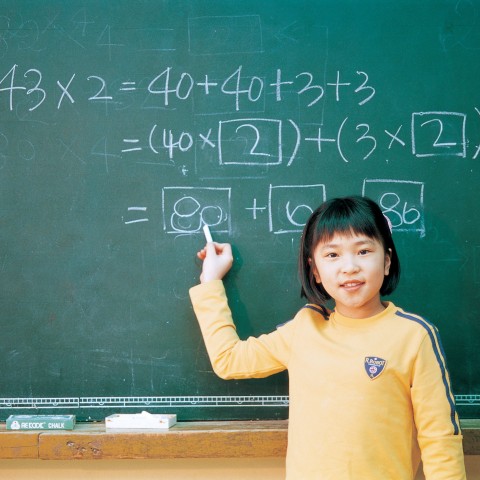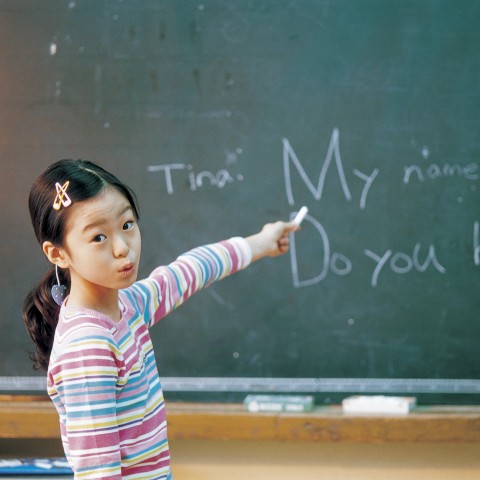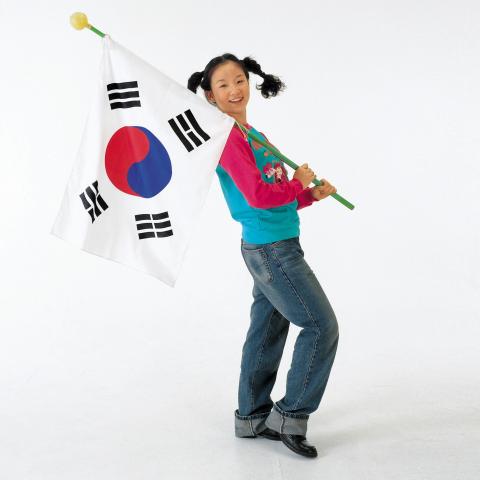Whether you’re the youngest or oldest person in a group, you’re expected to behave in a certain way in South Korea. For example, it’s important to show respect to someone who is older or of higher status than you by following expected protocol. This blog will guide you through how to use Korean honorific names and offer you cultural insights, so that you don’t offend Koreans next time you travel to South Korea!
1. Master List of Korean Honorific Titles
Before we begin, did you know that Korean and International age are different? Try to calculate your 한국 나이 (“Korean age”) the way that Koreans would. Also, keep in mind that there’s numerous ways to address someone who is older than you.
Definition of Each Korean Title:
- 오빠 (oppa)
- Literal meaning: “older brother”
- Is also used to call: A male friend or a male sibling who’s older than you (as a female)
- Is used by: A younger female to call an older male friend or sibling
- Example: 정국오빠, 사랑해요! (Jungkook oppa, saranghaeyo!)
- 형 (hyeong; hyung)
- Literal meaning: “older brother”
- Is also used to call: A male friend or a male sibling who’s older than you (as a male)
- Used by: A younger male to call an older male friend or sibling
- Example: 정국형 (Jungkook hyung)
- 언니 (eonni; unnie)
- Literal meaning: “older sister”
- Is also used to call: A female friend or a female sibling who’s older than you (as a female)
- Used by: A younger female to call an older female or sibling
- Example: 수지언니 (Sooji unnie/eonni)
- 누나 (nuna; noona)
- Literal meaning: “older sister”
- Is also used to call: A female friend or a female sibling who’s older than you (as a male)
- Used by: A younger male to call an older female or sibling
- Example: 수지누나 (Sooji noona/nuna)
- 선배 (sunbae; seonbae)
- Literal meaning: “senior”
- Is used to call: A female or male student who’s older than you at school/university
- Used by: A younger female or male student
- Example: If you’re a senior at a university and your friend is a freshman, you’re 선배 (sunbae/seonbae) to them.
- Opposite word of 선배 (sunbae; seonbae) is 후배 (hu-bae)
- 후배 (hubae; hoobae)
- Literal meaning: “junior”
- Is used to call: A female or male student who’s younger than you at school/university
- Used by: An older student to call someone who’s younger than him/her
- Example: If your friend is a freshman at a university and you’re a senior, your friend is 후배 (hu-bae).
- Opposite word of 후배 (hu-bae) is 선배 (sunbae; seonbae)
- 동생 (dongsaeng)
- Literal meaning: “younger sibling”
- Is used to call: A younger male or female sibling or any friend who’s younger than you (as a female/male)
- Used by: An older male/female or an older sibling to one who’s younger than them
- Side note: You don’t use this word when you call them. Call them by name.
- Example:
- 걔는 내 여자친구가 아니야. 그냥 아는 동생이야.
- Gyaeneun nae yeoja chinguga aniya. Geunyang aneun dongsaengiya.
- “She’s not my girlfriend. She’s just a younger friend I know.”
- 여동생 (yeodongsaeng)
- Literal meaning: “younger sister”
- Is used to call: A younger female sibling or any female who’s younger than you (as a female/male)
- Used by: An older male/female or an older sibling to a female who’s younger than them
- Side note: You don’t use this word when you call them. Call them by name.
- Example:
- 내 여동생 소개할게; 이름은 김수진이야. 수진아, 인사해.
- Nae yeodongsaeng sogaehalge; ireumeun Kim Sujiniya. Sujina, insahae.
- “Let me introduce my sister; her name is Kimk Sujin. Hey Sujin, say hi.”
- 남동생 (namdongsaeng)
- Literal meaning: “younger brother”
- Is used to call: A younger male sibling or any male who’s younger than you (as a female/male)
- Used by: An older male/female or an older sibling to call a male who’s younger
- Side note: You don’t use this word when you call them. Call them by name.
- Example:
- A: 준철이 어디 있어? (Juncheori eodi isseo?) “Where is Juncheol?”
- B: 아, 내 남동생? 지금 피씨방에 있어. (A, nae namdongsaeng? jigeum pissibange isseo.) “Ah, my brother? He is at PC bang.”
- 씨 (ssi)
-
- Literal meaning: “Mr./Miss/Mrs.”
- Is used to call: Someone whom you need to show some respect to
- Used for: Business environment
- Example: 소희씨 (Sohuissi)
- 님 (nim)
- Literal meaning: “Mr./Miss/Mrs.” (It’s more polite and respectful than 씨[ssi])
- Is used to call: Someone whom you need to show some respect to
- Used for: Business environment
- Example: 소연님 안녕하세요 (Soyeonnim annyeonghaseyo)
- 어머님 (umonim; eomeonim)
- Literal meaning: 어머니 (eomeoni) “mother”
- Is an honorific form of 어머니 (eomeoni) “mother”
- Is used to call: A mother-in-law or your acquaintance’s mother
- Used by: female/male
- Synonyms: 엄마 (eomma) A casual way to say “mother”
- 아버님 (abunim)
- Literal meaning: 아버지 (abeoji) “father”
- Is an honorific form of 아버지 (abeoji) “father”
- Is used to call: A father-in-law or your acquaintance’s father
- Used by: female/male
- Synonyms: 아빠 (appa) A casual way to say “father”
- Example: 좋은 말씀 감사합니다! (Joeun malsseum gamsahamnida) “Thanks for your kind words!”
- 아주머니 (ajumoni)
- Literal meaning: “middle-aged woman; madam”
- Is used to call: A woman in her forties to sixties
- Used by: female/male
- Synonyms: 아줌마 (ajumma) A casual way to say 아주머니 (ajumoni)
- Although 아줌마 is commonly used in daily life (compare to 아주머니) , it may offend some women. Therefore, if you’re not sure how to draw the attention of a middle-aged woman, just attract her attention by saying 죄송한데요… (Joesonghandeyo…) “Excuse me.”
- 아저씨 (ajusshi)
- Literal meaning: “middle-aged man; mister”
- Is used to call: A man in his forties to sixties
- Used by: female/male
- Example: 아저씨, 이거 얼마예요? (Ajeossi, igeo eolmayeyo?) “How much is this?”
- 할아버지 (halabuji)
- Literal meaning: “grandfather”
- Is used to call: An old man over seventy years old
- Used by: female/male
- Example: 할아버지 편찮으세요? (Harabeoji pyeonchaneuseyo?) “Are you feeling okay, grandfather?”
- 할머니 (halmeoni)
- Literal meaning: “grandmother”
- Is used to call: An old woman over seventy years old
- Used by: female/male
- Example: 할머니, 새해 복 많이 받으세요! (Halmeoni, saehae bok mani badeuseyo!) “Happy New Year, grandmother!”
- 아가씨 (agassi)
- Literal meaning: “young lady; miss”
- Is used to call: A young lady who isn’t married yet
- Used by: older people
- Example: 아가씨, 혈액형이 뭐예요? (Agassi, hyeoraekyeongi mwoyeyo?) “What is your blood type?”
- 이모님 (imonim)
- Literal meaning: “my aged aunt”
- Is used to call: A woman in her fifties to sixties
- Used for: Restaurants in the casual atmosphere
- Used by: female/male
- Example: (at a restaurant)
- 이모(님)! 여기 소주 한 병 주세요!
- Imo(nim)! Yeogi soju han byeong juseyo
- “Imo(nim)! Please give me a bottle of Soju!”
To add a Korean title is very easy. What you need to do is ask a person’s Korean age and her/his name. After that, just add Korean honorifics after their names. For example:
- 철수 (Chulsoo) + 형 (hyung) = 철수 형 (Chulsoo hyung)
- 지민 (Jimin) + 오빠 (oppa) = 지민 오빠 (Jimmin oppa)
- 효린 (Hyorin) + 언니 (unnie) = 효린 언니 (Hyorin unnie)
- 현아 (Hyuna) + 누나 (noona/nuna) = 현아 누나 (Hyuna noona/nuna)
In general, don’t use 여동생 (yeodongsaeng) or 남동생 (namedongsaeng) to call someone who’s younger than you. Call them by their name, such as 지민아 (jimina), 혜지야 (hyejiya). If you don’t have a Korean name, there won’t be any 아 or 야 after your name, so it will be only 제이슨 (jeiseun), 테레사 (teresa), 민탕 (mintang), 리하오 (rihao). For those who don’t know how to write your own name in Korean or want to have a Korean name, KoreanClass101 has a page dedicated to writing Korean names. In Korea, when you meet someone for the first time, the conversation below is often:
소희: 소연 씨는 한국 나이로 몇 살이에요?
Sohee: Soyeon ssineun hanguk nairo myeot sarieyo?
“How old are you Soyeon?”
소연: 한국 나이로 25살이에요.
Soyeon: Hanguk nairo 25 sarieyo.
“I am 25 years old (Korean age).”
소희: 아, 난 올해 26살인데!
Sohee: A, nan olhae 26 sarinde!
“I see, I am 26 years old!”
소연: 아, 그렇군요, 앞으로 소희언니라고 부를게요.
Soyeon: A, geureokunyo, apeuro sohuieonnirago bureulgeyo.
“I see, I will call you Sohee unnie from now on.”
A. Cultural Insight: What it Means to be Older
In Korea, age is important and addressing someone with an appropriate title is crucial. Also, you need to show respect to someone who is one year older or even just a few months older than you. This might sound crazy at first, but if you happen to be older than other fellows, there are many benefits you can enjoy:
1- Benefits of Being Older in Korea
1. You can order 동생 (dongsaeng) “young fellows” to do things for you.
If you’re older (either 오빠/형 oppa; hyung/hyeong or 언니/누나 unni/unnie; noona/nuna) and want to ask someone to bring you something or do things for you, you’re allowed to do this simply because you’re older. You can request simple tasks such as bringing you the phone (if it’s far from you), buying some food for you from the supermarket, and many other small tasks that you don’t want to do.
2. Others will show respect to you by bowing to you.
Koreans don’t wave or shake hands to say hello or goodbye to their seniors. You need to bow to elders to show courtesy. Also, did you know that there are different degrees of the bow to show politeness? A fifteen-degree bow is a very common way of greeting elders, and a forty-five-degree bow is to show the highest degree of politeness. Pro tip: Pay attention to 한국 드라마 (hanguk deurama) “Korean dramas.”
3. People will speak to you with formal language.
Do you know how to say a formal and informal “hello” in Korean? You can not say 안녕 (annyeong)—which is an informal greeting in Korean—to someone who is older than you. 안녕 (annyeong) is used when you’re speaking with someone of the same age or someone who is younger than you. If you want to greet an older person, you need to use formal language. In this case, you need to say 안녕하세요 (annyeong haseyo) which is a formal greeting in Korean.
Let’s see if you can distinguish the difference:
A: 효린아, 안녕. 주말 잘 보냈어?
Hyorina, annyeong. Jumal jal bonaesseo?
“Hello, Hyorin. How was your weekend?”
B: 효린 언니/누나, 안녕하세요. 주말 잘 보내셨어요?
Hyorin unni/unnie; noona/nuna, annyeonghaseyo. Jumal jal bonaesyeosseoyo?
“Hello, Hyorin unnie. How was your weekend?”
Which sentence uses formal language? Which one uses informal language? That’s right. A is informal language and B is formal language. Here’s another example. Let’s say that you’re working on a group assignment and you found out that you’re the youngest in the group. Which expression is most likely used by you?
A: 나 지금 어디 빨리 가야 해서, 나중에 얘기하자.
Na jigeum eodi ppalli gaya haeseo, najunge yaegihaja.
“Sorry, I have to go somewhere quickly, let’s talk later.”
B: 선배님, 그럼 연락처 알려주시겠어요?
Seonbaenim (or Sunbaenim), geureom yeollakcheo allyeojusigesseoyo?
“Okay, seonbaenim (or Sunbaenim), can I have your contact number?”
2- Disadvantages of Being Older in Korea
However, regardless of how you can take advantages of these things mentioned above, there are also downsides about being older in a group:
1. You are expected to pay for the lunch/dinner.
Have you ever heard someone say 내가 한턱 쏜다! (Naega hanteok ssonda) or 내가 쏠께 (Naega ssolkke)? It means “This is on me!” and these expressions are often used in South Korea, so it’s good to memorize them. You may be expected to pay for many activities such as lunch, dinner, movies, and so on if you’re older, and this is accepted in the workplace as well.
(You ordered some food at a café and 선배님 wants to pay for you.)
선배: 내가 오늘 한턱 쏜다!
Naega oneul hanteok ssonda!
“Today, it’s all on me!”
후배: 우와, 선배님 짱! 감사합니다!
Uwa, sunbaenim jjang! Gamsahamnida!
“Wow, thank you, sunbae (or seonbae)!”
2. You need to lead the group.
People show a decent respect to you, follow your orders, use formal language, and even bow to you when greeting. It does feel great, right? However, did you know that they expect you to show a strong leadership in return? Also, if they trust you, they will come to you to receive advice as well. So be prepared for it!
3. It might become difficult for you to make friends.
When you take advantage of your power, it may be fun for you in the beginning, but be prepared for consequences. No one wants to be with someone who likes controlling people. So be cautious of your actions.
B. Cultural Insight: What it Means to be Younger
If you’re younger or the youngest in a group, there are a number of things you’ll need to do for older people, including:
1- Use formal language/bow every time you meet them.
As explained above, you need to show respect to someone who is older or who has higher status than you. This may be challenging at first if you’re not used to it, but using appropriate Korean honorific titles is important in South Korea, so do your best to use these! Also, show some respect by bowing to them. There may also be times where you have to follow their orders even if you don’t want to, but it really depends on the person, so don’t worry too much about this.
A lot of students who are learning Korean struggle with 존댓말 (jondaenmal) “formal language,” but don’t worry, it takes time to get used to these Korean honorifics. If you’re able to use Korean honorific expressions when speaking to people in Korea, they will be surprised at first (because you’re fluent in Korean!) but they’ll also show great respect to you in return. Let’s try to learn a few different Korean honorifics:
– When you speak to a professor:
교수님, 집에 고양이 키우고 계세요? (formal language)
Gyosunim, jibe goyangi kiugo gyeseyo?
“Professor, are you raising a cat at home?”
– When you speak to a male who’s older than you
지민오빠, 집에 고양이 키우고 계세요? (formal language)
Jimin oppa, jibe goyangi kiugo gyeseyo?
“Jimin oppa, are you raising a cat at home?”
– When you speak to someone who’s the same age as you
영웅아, 집에 고양이 키워? (informal language)
Yeongung-a, jibe goyangi kiwo?
“Yeongung, are you raising a cat at home?”
2- Unless they allowed you to do so, never use informal language.
Not all Koreans strictly follow this rule as more and more people in Korea want to establish close relationships with others of different ages and backgrounds. Some 형 (hyeong; hyung), 누나 (noona; nuna), 오빠 (oppa), 언니 (unnie; unni), and 선배 (sunbae) allow 남동생 (namedongsaeng), 여동생 (yeodongsaeng), 후배 (hubae; hoobae) to speak 반말 (banmal) “informal language” in order to build a closer relationship with them and to erase hierarchy. However, it’s important to understand that you can’t use 반말 (banmal) unless you have been told to do so. If you start speaking informal language suddenly, there is a high chance that you’ll offend them.
2. Business/Work Titles
We’ve learned from the list of Korean honorific titles that if there’s someone who is older or has higher status than you at work, he or she will most likely call your name by [name]씨. There are many other titles that you can use in the workplace. For instance, if you want to call your colleagues and superiors, you can use [name]님 or [name]대리님 or another work title accordingly.
Here’s a list of commonly used work titles in Korea (ordered from higher status to lower status):
| Title | Romanization | Meaning |
|---|---|---|
| 회장님 | hoejang-nim | “Chairman(woman)” |
| 사장님 | sajang-nim | “President” or “CEO” |
| 전무이사님 | jeonmuisa-nim | “Sr. Managing Director” |
| 상무이사님 | sangmooisa-nim | “Managing Director” |
| 이사님 | isa-nim | “Director” |
| 부장님 | bujang-nim | “Division Head” |
| 차장님 | chajang-nim | “Vice Head of a Division” |
| 과장님 | gwajang-nim | “Head of a Unit” |
| 대리님 | daeri-nim | “Assistant Manager” |
| 팀장님 | timjang-nim | “Team Leader” |
| 사원 | sawon | “Employee” |
If you want to call someone from your work, simply add an appropriate title after his or her name.
For example:
- 윤서 대리님 (yunseo daerinim)
- 민경 과장님 (mingyeong gwajangnim)
- 민호 이사님 (minho isanim)
Keep in mind that not all Korean companies strictly follow these rules. Other (foreign) companies 외국계 회사 (oegukgye hoesa) “a foreign-affiliated firm” or start-up companies use either English names or 님 to everyone to allow for flat organization.
3. Be Careful When You Use Korean Honorific Titles!
It can be difficult to learn at first because there are many rules that you need to remember. Here are some tips for you to memorize so that you don’t make these mistakes in the future!
To call a taxi driver:
– Don’t: 택시기사씨 (taeksigisassi)
– Do: 택시기사님 (taeksigisanim); 기사님 (gisanim)
To call an old lady:
– Don’t: 아주머니씨 (ajumonissi); 아줌마씨 (ajummassi)
– Do: 아주머니 (ajumoni), 아줌마 (ajumma)
To call an old man:
– Don’t: 아저씨씨 (ajusshissi); 아저씨님 (ajussinim)
– Do: 아저씨 (ajusshi)
To call a grandfather:
– Don’t: 할아버지님 (halabujinim)
– Do: 할아버지 (halabuji)
4. KoreanClass101 Can Help You Improve Your Korean
KoreanClass101 has a lesson that discusses Korean honorifics in detail, so please check out our free Korean lesson “Show People Respect with Korean Honorific Speech.”
Even if you can read and understand Korean well, it can be problematic if you can’t pronounce the language properly. We have a free lesson on “How to Sound Like a Native: Korean Pronunciation” as well, so please check it out!
If you have any questions regarding the Korean language, culture, and more, check out our KoreanClass101 forum.
감사합니다 (polite form of “thank you” in Korean). We hope that you learned a lot of Korean honorifics today! Go put them to good use on your next visit to Korea!
















